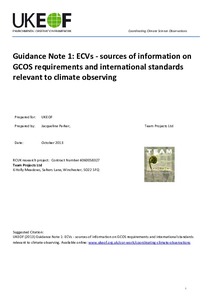UKEOF Guidance Note 1: ECVs - sources of information on GCOS requirements and international standards relevant to climate observing.

View/
Average rating
votes
Date
2013Corporate Author
UK Environmental Observation Framework (UKEOF)
Status
PublishedPages
32pp.
Metadata
Show full item recordAbstract
The GCOS Implementation Plan provides a programme of recommendations actions over a 5 year period to assist countries in understanding, predicting, and managing their response to climate and climate change. In the GCOS implementation plan (2010 update), a set of 50 ‘Essential Climate Variables’ (ECVs) are defined. These are systematically observable variables for climate assessment, all of which are considered both technically feasible and cost-effective for systematic observation. These ECVs are needed to make significant progress in the generation of global climate products and derived information.
GOSIC, the Global Observing Systems Information Centre provide overviews for each ECV that describe: ‘main climate application’, ‘contributing networks and satellite observations’, ‘issues relevant to observation and analysis’, ‘current capability’ and ‘data.’.....
Other Title
Guidance Note 1: ECVs - sources of information on GCOS requirements and international standards relevant to climate observing.ECVs - sources of information on GCOS requirements and international standards relevant to climate observing.
Publisher
UK Environmental Observation Framework (UKEOF)Bailrigg, UK
Series;Nr
UKEOF Guidance Note;1Document Language
enSustainable Development Goals (SDG)
1314
Best Practice Type
Manual (incl. handbook, guide, cookbook etc)Citation
UKEOF (2013) Guidance Note 1: ECVs - sources of information on GCOS requirements and international standards relevant to climate observing. Bailrigg, UK, UK Environmental Observing Framework (UKEOF), 32pp. DOI: http://dx.doi.org/10.25607/OBP-908Collections
 Repository of community practices in Ocean Research, Applications and Data/Information Management
Repository of community practices in Ocean Research, Applications and Data/Information Management